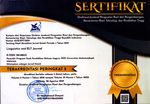Learning Loss Mitigation: The Perspectives of Senior High School English Teachers in Indonesia
Abstract
Teachers play a critical role in addressing the learning loss due to the Covid-19 school disruption by creating various strategies to overcome the loss. This paper aims to investigate several factors which impact to student’s performance and teachers’ efforts in overcoming the learning loss during Covid-19 pandemic. In a qualitative method with an open-ended survey and interview, 35 high school English teachers with at least 3 years of experience shared their experiences to overcome the learning loss. 10 teachers are clarifying their strategies to cope with learning loss due to Covid-19 school disruption by inadeptly interviewed. The thematic analysis of the data found that the teachers' strategies to overcome learning loss, teacher-student interaction, curriculum adaptation, and support from the government and school [1]. Most of the English teachers perceived that learning loss happened due to the lack of teacher-student interaction, inadequate facilities, and inauthentic writing skills during the Covid-19 pandemic. To overcome this, teachers adapted English modules with media technology to simplify English lessons and build learning independence despite the incomprehensive lessons. The support from the government and school-ICT training, technology teaching tools, internet, and E-learning sources - helps teachers reduce the learning loss possibility. The findings indicated the importance of supportive and adaptive English teachers in mitigating learning loss due to Covid-19 school disruption.
Keywords
Full Text:
PDFReferences
S. Arsendy, C. J. Gunawan, N. Rarasati and D. Suryadarma, "Teaching and Learning during School Closure:Lessons from Indonesia.," SEAS Yusof Ishak Institute, no. 2020, p. 89, 2020.
UNESCO, "COVID-19 Educational Disruption and Response," 2020.
Ministry of Education and Culture, "kemendikbud," 2020. [Online]. Available: https://www.kemdikbud.go.id/main/blog/2020/05/data-covid-19-pendidikan. [Accessed 14 June 2023].
World Bank, "Learning Losses in Indonesia," 2021.
Tarkar and Preeti, "Impact of Covid-19 Pandemic on Education System," International Journal of Advanced Science and Technology, vol. 29 (9), pp. 3812-3814, 2020.
Miller, N. C. Donohue and B. M., "Stemming Summer Learning Loss," New England Journal of Higher Education, vol. 23 (1), pp. 19-20, 2008.
P. Setyosari, D. O. A. Wibawati, C. Z. Fitriyah and R. P. Wardani, "Learning Loss: How does Technology Facilitate Learner Learning?," in AIP Conference Proceedings, 2023.
P. Engzell, A. Frey and M. D. Verhagen, "Learning Loss due to School Closures during The Covid-19 Pandemic," in Proceedings of The National Academy of Sciences, 2021.
S. D. Rahayu, "Learning Loss in The Teaching of English Subject at a Vocational School in Tanjung Jabung Barat," Langue (Journal of Language and Education), vol. 1 (1), pp. 1-19, 2022.
S. Pokhrel and R. Chhetri, "A Litterature Review on Impact of Covid-19 Pandemic on Teaching and Learning," Higher Education for The Future, vol. 8(1), pp. 133-141, 2021.
I. F. Kristiana, C. G. Widayanti, P. B. Widodo and Y. Indriana, "Learning Loss during The Pandemic: Views of Indoensian Teachers and Parents," International Journal of Education and Learning, vol. 4(3), pp. 179-190, 2022.
Gustiani and Sri, "Students' Motivation in Online Learning during Covid-19 Pandemic Era: A Case Study," Junal Ilmiah Bahasa Inggris, Holistics (Hospitality and Linguistics), vol. 12(2), 2020.
J. Allen, A. Gregory, A. Mikami, J. Lun, B. Hamre and R. Pianta, "Observations of Effective Teacher–Student Interactions in Secondary School Classrooms: Predicting Student Achievement With the Classroom Assessment Scoring System—Secondary," School Psychology Review, vol. 42(1), pp. 76-98, 2013.
M. V. Geel, T. Keuning, K. Meutstege, J. d. Vries, A. Visscher, C. Wolterinck, K. Schildkamp and C. Poortman, "Adapting Teaching to Students’ Needs: What Does It Require from Teachers?," in Effective Teaching Around the World: Theoretical, Emperical, Methodological and Practical Insights, Switzerland, Springer International Publishing, 2023, pp. 723-736.
U. Jederlund and T. V. Rosen, "Teacher-Student Relationships and Students' Self-efficacy Beliefs. Rationale, Validation and Further Potential of Two Instruments," Education Inquiry, vol. 14(4), pp. 529-553, 2023.
Z. M. Basar, A. N. Mansor, K. A. Jamaludin and B. S. Alias, "The Effectiveness and Challenges of Online Learning for Secondary School Students – A Case Study," Asian Journal of University Education (AJUE), vol. 17(3), pp. 119-129, 2021.
A. Alhamuddin, D. N. Inten, R. Adwiyah, A. Murniati and A. Fanani, "Academic Fraud during the Covid-19 Pandemic for High School Students," Indonesian Journal of Islamic Education Studies (IJIES), vol. 5(2), pp. 233-251, 2022.
B. Azhari and I. Fajri, "Distance Learning during The Covid-19 Pandemic: School Closure in Indonesia," International Journal of Mathematical Education in Science and Technology, vol. 53(7), pp. 1934-1954, 2022.
DOI: https://doi.org/10.31764/leltj.v12i1.24803
Refbacks
- There are currently no refbacks.
Copyright (c) 2024 Diana Hildianti, Puji Rahayu

This work is licensed under a Creative Commons Attribution-ShareAlike 4.0 International License.
_____________________________________________________
Linguistics and ELT Journal
p-ISSN 2339-2940 | e-ISSN 2614-8633

LELTJ is licensed under a Creative Commons Attribution-ShareAlike 4.0 International License.
_____________________________________________________
LELTJ is abstracting & indexing in the following databases:
_____________________________________________________
LELTJ Editorial Office:













